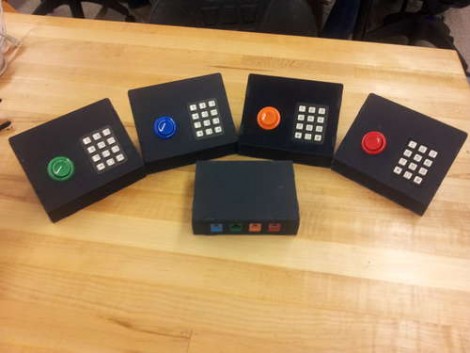
Want to host a Jeopardy tournament with your friends? Looking to add a bit more fairness to your school’s knowledge bowl? Perhaps you should build some buzz-in hardware of your own.
Here you can see [Matt Hanson’s] take on this idea. He used one Arduino to gather not just buzzer info, but also keypad data from four satellite controllers. Each has an RJ45 jack, allowing it to connect tot he base unit with an Ethernet patch cable. We like the color coding that [Matt] chose, which matches the color of the arcade button to the keystone jack on the base. And of course the fantastic look of the water-jet cut cases isn’t lost on us either.
You may wonder why he included a key pad on each controller? It looks like he and a few others worked together to develop a team-based math game for use in school.















looks great, but I would have suggested the buzzers connect to the hub via wireless tech. Now you’ll have to bring long (tangling,tripping) wires to the class room.
Let the synchronization complaints commence!
How well does this handle two or more buttons going down at once?
I’m not sure if anything can handle the possible, but probably improbable event of multiple switches being turned on at the exact same time. Other than reporting an error, and the contestants moving onto the next quiz question.
Well let’s say the switches are polled at a 50ms rate, kind of slow… but not out of the question. Supposing the polling goes in order and button 2 goes down 100ms after button 4, button 2 may be declared the winner if the polling was checking button 1 right as button 4 was pressed. Got it?
Now suppose two people slam down the button at visually the same time, but one is slightly before the other. Now the polling delays can skew the results badly.
One way to fix it in software would be interrupt on pin change.
Another way would be a hardware lockout done in high speed cmos logic gates… down at 10-30ns, you are pretty much guaranteed you have the right button that was first pressed.
Schematics are just references to other Instructables… and where is the Arduino sketch? It doesn’t seem to be in the ZIP with the Processing sketch.
Wow, I helped design a similar system back in the 80s using some discrete components and a set of huge buttons I sourced from a surplus electronics store. It wasn’t very complicated and it worked for many years.
I can’t say I remember the *exact* design very well, but I remember it handled ‘multiple’ presses impressively well. IIRC, the first button pressed would bounce a circuit that simply disconnected the other 3 circuit paths almost instantaneously. The closed circuit would trigger a buzzer and a circuit that lit up the panel in front of the correct contestant.